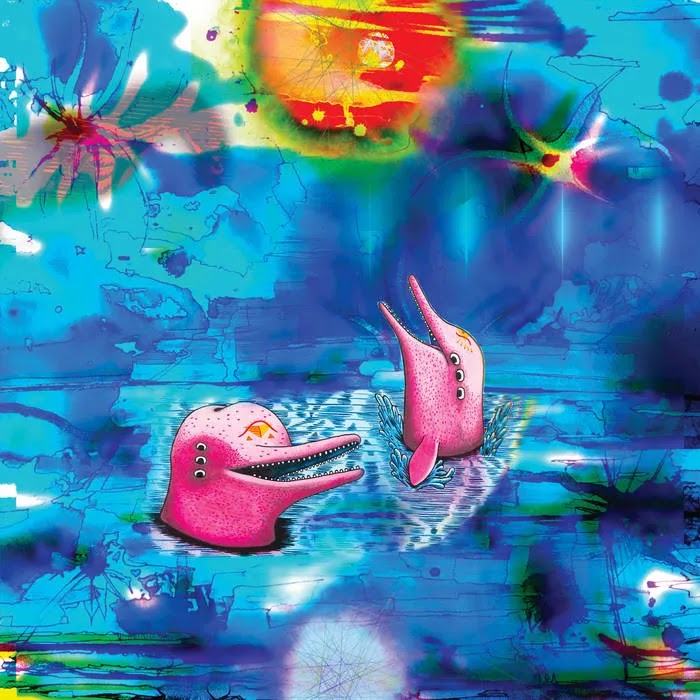Trumpeter jaimie branch and drummer Jason Nazary team up with producer Jeff Parker on an album of electronic jazz fusion and aqueous psychedelia.
It’s easy to say that jaimie branch is one of the most exciting trumpeters to bubble up in recent years—much easier than saying just what kind of trumpeter she is. The Brooklyn resident honed her punk intensity and classical training in a Chicago scene where the borders between rock, free jazz, and electronic music are porous, and it shows. Yet her distinctive instrumental voice and spirit of refined anarchy make her work cohesive. She turns tense, dashing themes that wouldn’t seem amiss on an Arcade Fire song into exploded-view drawings of extended technique and free expression, her tone bleeding rainbows at the edges but almost translucently pure in the center.
Though branch has worked with a number of indie bands, including TV on the Radio and Bell Orchestre, she’s best known as the bandleader of Fly or Die, with bassist Jason Ajemian, cellist Tomeka Reid, and drummer Chad Taylor—all of them heavy players in the heady Chicago of Tortoise, Rob Mazurek, Ken Vandermark, Thrill Jockey, and International Anthem. While the quartet’s two acclaimed albums are unruly and roving, full of Dutch angles and long shadows, they are clearly acoustic jazz. Pink Dolphins, by branch and Jason Nazary, is something else, in every sense.
The album’s title comes from the pink river dolphins of the Amazon, partly in tribute to branch’s Colombian heritage but also simply for what she calls their “aquadelic” vibe. (The cover image, which branch painted, resembles a lost Basquiat design for a 1980s Trapper Keeper.) The phrase captures the music much more succinctly than my best attempt, which involved Miles Davis and Anna Meredith making a dance record after microdosing together at SeaWorld. Anteloper is a great name and all, but LSD Soundsystem was right there.
The record comes with the imprimatur of Tortoise, the band that reformatted the free energy of Chicago improv for a general audience. Drummer John Herndon added digital finishing to branch’s painted cover, while guitarist Jeff Parker served as the Teo Macero to branch’s ’70s Miles—an avowed influence, along with the giants of tropicália and funk experimenters like Sun Ra, J Dilla, and the fusion torchbearers Harriet Tubman. Like Macero, Parker stretched the definition of a producer, milling down hours of improvised sessions, soliciting new bits, and adding his own guitars and keyboards until an album emerged. Nazary’s trap kit is mixed with pads that trigger electronic effects and sounds, reinforcing a feeling of vibrational connection. The lengthening tracks are deepening waters, which branch’s solos cut across like proud sails.
With “Inia,” the album opens in an aquadelic mode, gathering something between feedback and whale song into a krautrock theme before branch’s trumpet bursts in with signature bravado. On “Delfin Rosado,” a concise showcase of her intrepid style, she works her way over a mutable landscape of mbira funk and leftfield disco to an emphatic climax of layered, stabbing peals. Her knack for trussing riffs and trills into thrilling off-center patterns is also the high point of “Earthlings,” a trip-hop blues with creepshow synths, sawtooth bass, and branch’s low-slung singing, a mix that sounds like Portishead channeling Ella Fitzgerald.
Nazary, an Autechre fan, pays tribute with the relatively dry and jittery setting of “Baby Bota Halloceanation”; in branch’s periodic improvisation, pauses are held like breaths and you never know if the next run will be a curl of smoke or a slashing beam of 16th notes. It’s an austere prelude for the superabundant closer, “One Living Genus,” which has a little of everything: soft sprays of ambient pads, sunstruck walls of psychedelic color, fragrant breezes of harmony, glitch-hop flute, a twinkle of guitar—is that a didgeridoo? The effect is pristine yet distorted, a sunny postcard horizon twisted like a filter’s cutoff knob. If there were any complaint, it would be that it ends perfectly after nine minutes and goes on for six more. But grant them the decompression after their deep dive turned up such sparkling treasure.



0 comments:
Post a Comment